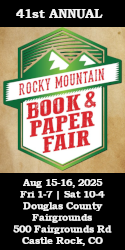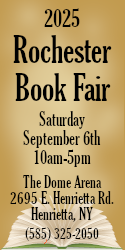Books in Georgia
A few weeks ago we visited some bookshops and book fairs on our way to Jekyll Island, just off the coast of Georgia, and along the stretch of I-95 between Richmond and the North Carolina border, what seemed like an unusually high number of Virginia state police in unmarked cruisers were pulling over a lot of cars with out-of-state license plates. We understand that many states are in a financial bind these days, but hope they weren't trawling for dollars at the expense of tourists and other soft targets. We were careful to mind the posted speed limits and weren't stopped, so we really aren't taking this personally.
The Morgan Library in New York is known to almost everyone, in or out of academia or the rare book business, but not all of you may know that Georgia's relatively secluded barrier island was one of J.P. Morgan's favorite winter escapes, where he could hob nob in relative seclusion with his fellow millionaires at the Jekyll Island Club.
Morgan was responsible for the creation of one of the most fabulous private rare book and manuscript collections ever assembled, all within a relatively short period (by European standards), but how much he would have accomplished without the expert advice of Belle da Costa Greene, his librarian and the first director of the Morgan Library, is a matter for conjecture. She knew and cultivated her relationships with the dealers and they were key to the growth of the Library's collections.
By chance I happened to learn late last year that the Morgan indoor tennis building, located just behind San Souci “cottage” where the family spent part of each winter, was going to be rescued from near-abandonment and redeveloped as a rather posh conference and exhibition facility on the grounds of the old Jekyll Island Club—since the late 1980s run as a turn-of-the-century, grand hotel in the island's historic district.
The future of the Atlanta Antiquarian Book Fair is uncertain at the moment because the promoters have been unable to find a suitable new location in time for their event that normally takes place in early September. Whether or not the book fair returns to Atlanta for the 2011 season, Jekyll Island recommends itself both as an ideal, as well as an iconic location for a small, up-market book fair where serious bibliophiles (and booksellers) in need of a spring or autumn break could combine vacation time with some serious bookhunting. And once the old Morgan tennis building is up and running as a conference center later this year, the historic connection and location should make it a very attractive venue for promoters of all sorts of special events.
A License to Buy Books & Ephemera?
A curious case that has been working its way through the City of Los Angeles legal system for at least a year involves Richard Hopp of Van Nuys (CA) and the Los Angeles police department. Mr. Hopp is a collector of books, documents and ephemera, has set up “exhibitor's tables” or “buying booths” at various trade shows or swap meets around the city, and has been told by the police department that he must obtain a permit for these collecting activities, even though Mr. Hopp maintains he is a book collector, not a seller, and therefore exempt from the legal requirement.
Without going into too much detail, the Los Angeles city court originally found against Mr. Hopp, asserting that as a “secondhand book dealer” he is required to obtain a permit or license even if not engaged in selling activities. In the appeal (Richard Hopp v. City of Los Angeles) brought before the Second Appellate District, Division Two, of the State of California, the Court of Appeals reversed the earlier verdict and decided in favor of Mr. Hopp (Case Number B215265).
What gets interesting though is that the appeals court decision is “not to be published in the official reports”, which “prohibits courts and parties from citing or relying on opinions not certified for publication or ordered published...” Our thought is that a published opinion would provide useful guidance for people finding themselves in a similar situation, without having to tread the same legal ground at considerable cost of time and money. In any event, we have cited the case number for anyone wanting to investigate further.
Ongoing Changes in Media
About a week ago the local video store, Movie Gallery, closed its doors and sold the remaining inventory to the liquidators. It occurred to me that in the short history of video stores, the industry has gone through a life cycle, although intensely conflated, not dissimilar to that of retail book stores that have been around for hundreds of years.
Many 19th century book stores, like late 20th century video stores, relied on rental income as much as on actual sale of goods—think of Blockbuster as a modern-day Mudie's Lending Library. Netflix is not the only reason video stores have fallen on hard times—whether cheaper rentals by mail, downloads from the Netflix website, or movies-on-demand via cable—all have contributed to their decline. A few years ago, and especially towards the end, the local Movie Gallery began to offer “previously-viewed” and in some cases new DVDs to supplement their rental income. By that time it had become more like a book store selling new, used and out-of-print books. In a desperate attempt to retain market share, all sorts of promotional ideas were tried, at least locally, but in the end nothing semed to work. An entire local retail life cycle in just a little over 20 years.
Yet after more than 200 years, bookstores are still around. Beyond the superficial similarities in their respective business models, there were and are important differences—independent book stores tend to be run by bookish romantics in denial, chain video stores by beady-eyed accountants. Also, the movie you bought that is stored on a dvd, a video tape, or one of those analog laserdiscs from the 1970s (remember those?) is only viewable if you have working electronic equipment that will play it for you.
The same is true for the newer electronic book readers—if they break down or are no longer supported by the manufacturer, the text may be lost, even though you could buy it again in the same or some other format. Paper, maybe? (Oddly enough, I can't help thinking of some unpublished and now lost text files on a 5-1/4'' floppy disk that ran on my old KayPro from the 1980s). And now that newer electronic book readers are coming on the market all the time, I can't help but think of the Kindle as next year's 8-track player. (No need to rush out and spend a few hundred dollars on one right now—in a couple of years you'll probably be able to pick them up at garage sales for next to nothing).
And you don't have to be a luddite to appreciate that it's a comforting advantage to need nothing but your eyes between you and the written or printed word. No hardware, no software, no re-chargeable batteries, or no expiring licenses that could make a downloaded book vanish at any time—as has indeed been reported in a few instances. But if you do own one, please don't feel too bad—I have an old 8-track from the1970s gathering dust somewhere in the attic. It might even work.
I also don't mind risking public humiliation and embarrassment by openly predicting that all of this will ultimately be bullish for books made from paper and cloth and for places that sell them. You can even ignore all of the romantic fluff that's been written about books and book stores over the years. Strip it all away and the hard practicality remains.
A Renewal Reminder & A Note
The publication of Flying Boats Over Rochester, the illustrated history of the Short Brothers flying boat builders in Rochester (UK), has been delayed for several months, according to the publishers (Paul & Sheila Minet of Piccadilly Rare Books). The entire edition, both limited and regular trade, must be re-run because of printer error relating to the color plates. Aviation enthusiasts have been anticipating publication of this book for some time, so the delay is a bit disappointing. For more information please contact Piccadilly Rare Books
Judging by the number of “A-List” renewals over the past two months, many of you read the “Don't Forget to Read Your Mailing Label” request in our March/April issue, took it seriously, and responded positively with contributions and encouragement. However, if the “Summer Open Shop Guide”, “Specialists' Directories” or “Catalogues Received” sections in this issue seem a bit shorter than normal it means that a few booksellers forgot to read their mailing labels (indicating their subscriptions had expired) and gave up their free trade listings in the process. If you're one of the booksellers so affected and would like to rejoin the “A-List” please get in touch by phone or e-mail.
In a wonderful example of what I consider the spirit of socialism at its best, a long-time subscriber (see: “Letters”) sent an “extra $20.00 for someone on the ‘B-List’ who might be a bit down on his/her economic luck...just now...” Coincidentally, in the very same mail we received a request for a free subscription from someone in a small town in Georgia—so Charlie Calkins from Wisconsin gets to help out a fellow-bibliophile more than a thousand miles way. I call it socialism at its best because it comes from a real and unconstrained spirit of individual generosity, not the raw power of the state. With people like Charlie we may never get to retire—I don't think I could handle the guilt.


























